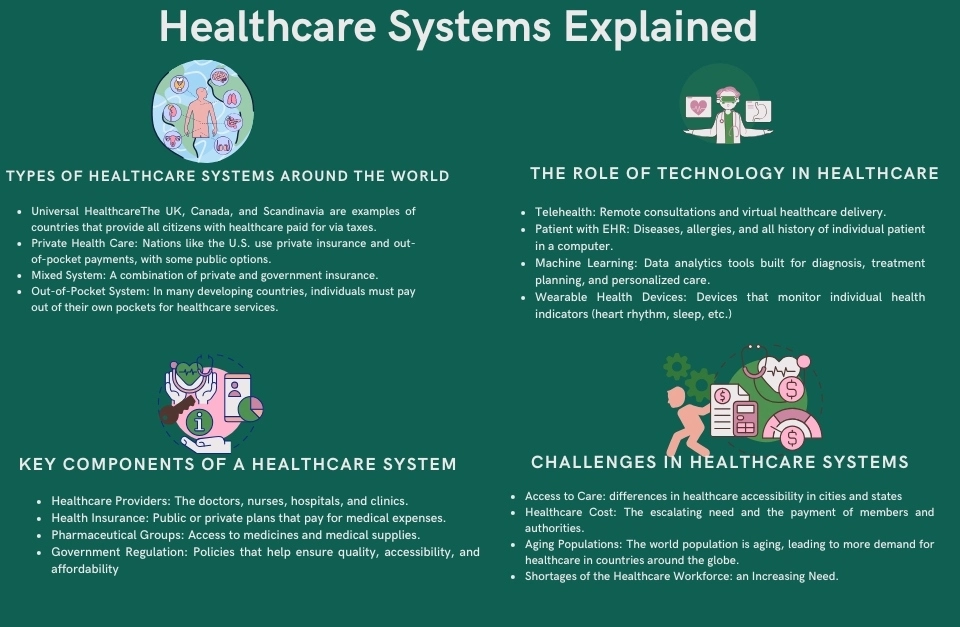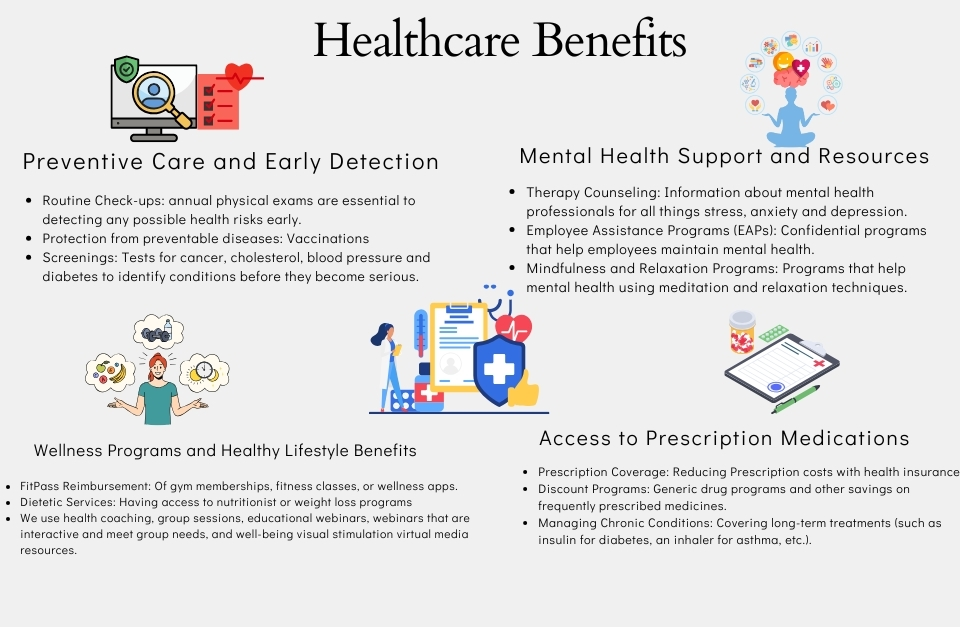Explore healthcare services, medical care options, and how to access quality health treatments. Learn about clinics, hospitals, wellness, and preventive care. When it comes to understanding how healthcare, micro to macro, affects life we must explore its many layers; whether you’re the healthcare consumer, the patient yourself, or the undeclared voter contemplating what your vote means this November.
This guide will take you through the key aspects of healthcare, from the intricacies of healthcare systems to the role of the technology, and the policy that shapes them. Let us understand its importance, loneliness and opportunities for all.
What Is Healthcare?
Healthcare refers to the service of maintaining or improving health through the prevention, diagnosis, treatment, recovery, and health counseling. It is about giving people and communities the tools to be physically, mentally, and emotionally healthy.
Why Is Healthcare Important?
Enhances Life Expectancy: Health care systems are critical for diagnosing diseases in the early stages, making treatment available and providing preventive care such as health screenings and vaccinations.
Enhances Quality of Life: By way of primary care, Mental Health assistance and advanced treatment, healthcare enables individuals to live healthier, more satisfying lives.
Fuels Economic Impact: With its role in describing healthier workforces, reducing healthcare disparity, and increasing general productivity, a strong healthcare system will in turn help stabilize your nation economically.
Healthcare Systems Explained

Health care delivery is different around the globe, determined by economic means, government mandates and cultural mindsets. Here’s a guide to the main kinds of Healthcare systems.
Public Healthcare
The UK’s Nationalled Health Service (NHS) is an example of a government-run model, where healthcare services are provided through taxation, ensuring all have access affordable care.
Private Healthcare
On the other hand, private healthcare systems, like those in the U.S., allow patients to purchase private health insurance. This way there is a lot of innovation, as providers often compete on grounds of skill or service, but access to healthcare is tied to employment or health plans, causing a lot of unfilled gaps for uninsured citizens.
Universal Healthcare
For example, countries such as Canada and Germany have universal healthcare, which means they provide medical coverage for all citizens, regardless of their socioeconomic status. It conducted public funding and distributed private providers for efficiency.
Hybrid Systems
Countries including Australia exemplify hybrid systems — these systems balance public and private healthcare to provide better accessibility and improve the quality of life, whilst allowing those with the financial means to pay for private care options.
Types of Healthcare
Healthcare functions on many layers, each layer serves its own particular needs and requirements.
Primary Healthcare
It involves preventive care and overall wellness – routine check-ups, immunizations and health education. Your family doctor is the professional to go to here.
Secondary Healthcare
This tier includes specialists — cardiologists, orthopedists and the like — who provide more focused treatment for conditions beyond primary care. Chronic disease management is one of them, for example.
Tertiary Healthcare
These services belong at the high end, such as cancer treatment, organ transplants, or advanced surgeries. Those are offered at specialized hospitals or clinics designed for complex care.
Quaternary Healthcare
At the forefront of medicine, quaternary care covers experimental treatment options, as well as groundbreaking treatments that are usually gained through clinical trials.
health care definition
Healthcare is the organized provision of medical services to prevent and treat illness in a given population. It includes a variety of services, such as preventive, diagnostic, therapeutic, and rehabilitative care, provided by professionals like doctors, nurses, and other health providers.
Healthcare aims to maintain and improve a patient’s health through diagnosis, treatment, and prevention of disease, illness, injury, and impairment.
Here are some definitions of health care from different sources:
Merriam-Webster: Health care involves the actions taken to maintain, restore, or improve an individual’s Physical Mental or emotional health
Wikipedia: Health care (also health care) is the act of preventing, diagnosing, treating, ameliorating or cure disease, illness or injury.
American Medical Association: Health care is viewed as a basic human good, because it shapes our opportunity to pursue our life goals, alleviates pain and suffering and prevents early death.
Healthcare Professionals and Their Roles

The coordination of quality patient care behind every consultation, surgery or therapy is carried out by a closely-knit group of healthcare providers.
Doctors: From primary care providers to specialized surgeons, they diagnose and treat a range of health issues.
Nurses and Medical Assistants: The backbone of day-to-day patient care, ensuring both physical and emotional support.
Allied Health Professionals: These are Physical therapists, radiologists, lab technicians whose job it is to help with specialized treatment and diagnosis.
Pharmacists: Medication management and treatment safety.
Mental Health Therapist: Therapy, counseling, and mental illness prevention.
The Evolution of Healthcare Delivery
The days of healthcare being solely reliant on in-person appointments are long gone. Services are available more than ever in today’s world.
Hospitals and Clinics: Where emergency services and specialized care is common.
Telemedicine: Virtual consultations improve access to care, even in low-resource settings.
Home Healthcare: It is framed for those individuals who require long term care patients, providing them personal attention at home.
Impact of Health Insurance
- This value-added function of public insurance acts as a good complement to affordable care and coverage for the vulnerable.
- Private insurance tends to have more customized offerings, however this comes at a high price.
- Programs like HealthCare. This site allows individuals to connect with the insurance marketplace, which lists premiums and tax credits, and guarantees access to coverage.
Healthcare Technology
Innovative solutions for healthcare that provide speed, accuracy, and prevention have been supported by technology and are shaping our future of health.
- Digital Health: Tools like electronic health records streamline data management, ensuring seamless communication across healthcare providers.
- Healthcare AI and Robotics: AI-driven Robots improve accuracy and minimize human error, from diagnostics to surgical maneuvers
- Wearable health devices: Personal trackers and smartwatches provide real-time monitoring of workouts, heart rates and even mental well being.
- Drug Development: Innovations speed the study of lifesaving drugs and experimental therapies for rare diseases.
Challenges in Healthcare
- Though there have been extraordinary strides, healthcare faces urgent challenges that need urgent resolve.
- But like mine, rising health-care costs are still an impediment to good care for many.
- A worldwide shortage of health professionals is hindering equitable service provision.
- Policies for inclusion are essential becausehealth disparities are leaving already struggling communities behind.
A growing elderly population and a growing burden of chronic diseases such as diabetes and heart disease drive demand for long-term care.
What Lies Ahead for Healthcare?

Especially, the arena of medicine is being revolutionised by science and technology towards the bright future.
Personalized Medicine: Paving the way for Effective recovery routes that are specific to an individual’s biology and the genetics.
AI Integration: Predictive tools will empower faster diagnostics and lighten the burden on human resources.
Sustainable Practices: Whether it is building environmentally friendly hospitals or having a more sustainable supply chain, healthcare systems are focused on sustainability.
Mental Health Revolution The increased recognition of mental health problems means that these challenges are finally being given the attention they deserve, alongside physical health.
health care disparities
Healthcare inequalities are differences in ability to access, quality and results of healthcare among groups of people, often driven by race, income, geographical and educational differences. The systemic inequities lead to socioeconomics, practices, and resources that contribute to the difference in outcomes.
They contribute to worse health outcomes, increased rates of chronic disease, and shorter life expectancy in the communities they impact. Tackling healthcare disparities is essential to establishing a just and equitable healthcare system that provides the conditions of optimal health for everyone. [Read: 9 myths about populations with disabilities]Every little bit helps — taking steps toward equity today can ensure a healthier tomorrow.
Loneliness becomes a parasitic navigator, even in the company of others. It casts a shadow over even the brightest moments. But in that silence is space for healing, reflection and growth.
how to improve health care quality
There are various strategies taken to enhance the quality of healthcare services that focus on patient outcomes, efficiency, and service delivery. Here are some key approaches:
- Patient-Centric Care: Always put the needs and preferences of patients first, making sure they are engaged in their own treatment.
- Technology Utilization: Adopting EHR and telehealth for improved information access and healthcare accessibility.
- Evidence-Based Practices: Assume best practices and clinical guidelines that are research-based and stay relevant and current.
- Continuous Training:Provide the ability for healthcare professionals to take continuous education and training to ensure they are up-to-date with the latest advancements.
- Quality Metrics:Invest in AnalyticsExhibit Go-Getters in Metrics Quality Metrics: Use data and analytics to monitor performance and identify areas for improvement.
- Patient Safety: Introduce measures to minimize the risk of errors and improve patient safety through standardized checklists and procedures.
- Integrated Care: Implement an integrated care model that promotes collaboration between diverse healthcare providers to deliver seamless and comprehensive care.
- Feedback: This data helps to assess how well your center is performing and identify areas for improvement.
Ways that could build a better, more efficient, effective, and patient-centered healthcare system.
Healthcare Benefits

The access to healthcare services can provide numerous advantages on an individual and a community level. Conducting no less than rewarding illnesses, this is enna̅;; it is a day of free, serrated life and creating a happier day for free, people or a day to maintain a more awake, more show and day. Some of the benefits of quality healthcare include:
- Improved Health Outcomes
Healthcare prevents, diagnoses, and treats illness, so people can live better and longer. Preventive care can identify potential problems before they develop into serious concerns; this includes vaccines, screenings and checkup appointments. You can, however, prevent strokes by regularly checking your blood pressure, and by getting screened for cancer early, which can save lives by identifying the disease’s most treatable forms.
Another important factor is mental health support. Mental health services offers individuals the resources and support needed to cope with stress, anxiety, and Depression, thus enhancing their overall quality of life.
- Enhanced Quality of Life
Healthcare and quality of life are intertwined. Whether it’s treating chronic conditions like diabetes or alleviating pain via physical therapy, care allows individuals to live fuller lives with fewer restrictions. Healthcare systems encompass more than just physical health, offering resources for emotional and social wellbeing, so that people can fully engage in their communities without health concerns impeding them.
- The Economic Benefit to You and Your Community
Healthcare access expands the scope for those who receive treatment to overcome potentially life-altering grievances without incurring significant debt. Access to preventative care and early intervention decreases any need for expensive, extensive treatment later on. For communities: healthy populations are more productive, support economic stability/growth, and decrease healthcare disparities.
Workplace wellness programs such as health screenings, fitness and incentives for employees were found to result in less sick days taken, job satisfaction and productivity.
- Chronic Disease Management Support
Dealing with chronic conditions, whether related to heart disease or asthma, could be overwhelming; however, health care services offer resources with which individuals can better learn how to manage their illness, along with supporting others with similar conditions. Regular follow-ups, access to specialists and tailored care plans empower people to manage their conditions and minimize complications.
- What You Can Do for Stronger Communities
Healthcare is foundational to building strong, healthy communities. By preventing the spread of infectious diseases, vaccination programs protect public health. Access to reproductive health services promotes family planning and maternal health, laying the groundwork for healthier generations.
- Empowering communities with the ability to stay healthy—such as access to clean facilities, nutrition education and mental health resources—facilitates equity and resilience during times of stress.
Why Healthcare Access Matters
Consider health care like a safety net that catches and holds us in every stage of life. It’s a resource that makes certain that everyone in the community has the chance to create their healthiest and most fulfilling life. Healthcare systems fortify not only individuals but the spirit of entire communities when they provide preventive care, manage chronic diseases, and offer mental health support.
Prioritize your health. Take the first step—make that appointment for a checkup, get preventive care, or check out resources that support your health and wellbeing. It is an investment in yourself, your family and the future.
Why Is Health Care Important for Everyone?
Health care is not only a service but also a lifeline. It is the bedrock for strong individuals, vibrant communities and a healthy economy. When everyone has access to quality health care, the benefits to us all are infinite. So let’s dig into why health care matters for everyone and how it affects your life and society as a whole.
Increasing Well-Being on Individual Level
And your health is your most valuable asset.” Health care allows you to have the tools and resources so that you can care for your body and mind. From routine physicals to identifying health issues early when treatment is most effective, quality care prevents diseases before they can cause serious harm. When you’re healthy, you go after your goals, help your loved ones, and live a full life.
That’s where preventive care comes into play. Such measures as vaccinations, routine screenings and wellness visits save lives. For example, catching high blood pressure early while taking vitals can help prevent things like heart disease in the long term. Investing in prevention is investing in your future self.
Long Term Cost saving In Healthcare
Now, imagine catching a problem when it’s still small and manageable, rather than waiting until it’s turned into something serious — or even deadly. That is what health care does when people can get it. Regular checkups and preventative measures decrease emergency room visits and the expensive long-term treatment and they ultimately save individuals and health systems money.
Access to diabetes management programs could prevent complications, such as kidney disease or vision loss, one example that comes from the literature. This not only enhances the quality of life of the individual, but it also alleviates the financial burden on families and the healthcare system as a whole.

Building Community Health
Being healthy is not just an individual concern. While well, you’re more likely to support your community, through work or by helping others. Universal access to health care empowers neighborhoods through greater public health (no spreading illnesses) and the flourishing of individuals, who can then participate productively and meaningfully in their community.
Think about the effects of vaccination programs. When enough people get vaccinated, the spread of contagious diseases slows, protecting even those who, for medical reasons, might not be able to get vaccinated. This trickle-down effect illustrates how health care is a collective responsibility that benefits communities as a whole.
Supporting Economic Stability
There is a strong correlation between health and wealth. When steps to keep people healthy empower them, they can work, innovate and contribute to the economy. On the flip side, untreated illnesses or chronic conditions can result in missed workdays, a reduction of productivity and financial strain.
For businesses, a healthy working population equals fewer absences and higher productivity. Lower public health costs and more economic growth — healthier populations translates to such things for governments. A stronger, more stable economy for us all; ensuring everyone can access care.
The Role of Preventive Care
Preventive care is the foundation of a healthy life. It’s about taking charge of your health before a problem develops. That means annual physicals, mental health check-ins, dental visits and lifestyle advice all personalized to you. It’s not about being perfect, it’s about taking small, steady steps for your health.
Preventive care teaches us that small steps — getting that flu shot, scheduling a mammogram, even just speaking with a doctor about Stress Management are hugely significant. Each step matters. Together, these efforts compound into a healthier, more robust version of you.
Do Something for a Better Tomorrow
Health care matters because people matter — because you matter. Start now. Take care of your health by scheduling a checkup and resolving lingering issues or encouraging loved ones to do the same. And just a note: self-care isn’t selfish — it protects your tomorrow and allows you to show up fully in every area of your life.
We are making the world a better place for everyone, just by acknowledging that health care is a necessity. It starts with that first step. Take it. Your health — and your future — depends on it.


1 Comment
nice